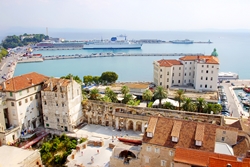 |
Welcome to
tCSC2013
, the first thematic CERN School of Computing.
tCSC2013
is a new concept prototyped for the first time in
2013. It aims at complementing the existing portfolio of CSC
events: the historical main summer school, organized since
1970, the
inverted CSCs (iCSCs) organized since 2005, and the
special schools, as organized in 2006 in Bombay.
Shorter,
smaller, focused are the three distinguishing features of
tCSC.
But, though different from the main CSCs, the
tCSC maintain the same
guiding principles:
1. Academic dimension on
Advanced topic
2. Theory and practice
3. Networking and
socialization
We hope this initiative will receive a
favorable response from all those, newcomers to CSCs or
former participants interested in deepening their knowledge
on state of the art computing.
François
Fluckiger, Director, CERN School of Computing
|
| |
|
|
Sumary of
tCSC2013
theme
|
Do you
have what it takes to squeeze out a modern computer like a
lemon? This weeklong intensive training is an advanced dive
into software, tools and techniques for exploiting current
computing hardware. Core topics include practical use of
relevant software methodologies for parallelization,
efficient use of compilers, performance optimization,
controlled floating point calculations – all coupled with
hands-on exercises. In addition to the core teaching
material, a range of supplementary topics is offered, such
as select aspects of supercomputing, accelerated processing
and others. Finally, perspectives on cutting edge software
and hardware will be presented, along with a vision of
projected developments and their possible consequences.
|
| |
|
| Local organizer |
Chair-person, Local Organising Committee
Ivica
Puljak,
University of Split
(FESB)
|
| |
|
|
Lecturers
|
Sverre Jarp and
Andrzej Nowak as theme lecturers, with an introduction on Physics
Computing by
Ivica Puljak |
| |
|
|
|
|
Mastering
State of the Art Computing
|
|
Data oriented design
Designing for data,
data-intensive applications, vectorization
Memory
programming
Memory effects in hardware, choosing data
structures, non-uniform memory
Parallelism
Threads, tasks, problems and overheads, parallelization technologies
and environments
Efficient computing
Architecture refresher (big and small cores), accurate and efficient
floating point, compilers: their strengths and weaknesses, advanced
performance monitoring and tuning
Acceleration
Principles of programming for accelerators, programming
modes, GPU (CUDA) and MIC/Xeon Phi
|
|




